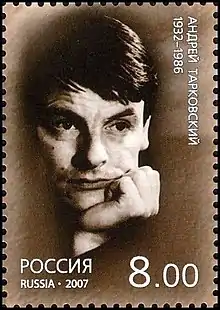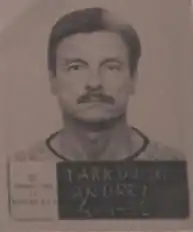Andrei Tarkovsky filmography
Andrei Tarkovsky (1932–1986)[1] was a Russian film director, screenwriter and film theorist. He directed several student films, co-directed a documentary, and was the author of numerous screenplays, both for his own films and for those of other directors. He directed two stage plays and one radio production, played minor acting roles in several films, and wrote a book on film theory.

Born in the Soviet Union, Tarkovsky began his career at the State Institute of Cinematography with several student films. In 1956, he directed The Killers, adapted from Ernest Hemingway's eponymous short story. His first feature film was 1961's Ivan's Childhood, considered by some to be his most conventional film.[2] In 1972, he directed the science fiction film Solaris, which was a response to what Tarkovsky saw as the "phoniness" of Stanley Kubrick's 2001: A Space Odyssey (1968).[3] Solaris won the Grand Prix at the Cannes Film Festival. His next film was Mirror (1975). His final film produced in the Soviet Union, Stalker (1979) garnered him the Prize of the Ecumenical Jury at Cannes. Tarkovsky left the Soviet Union in 1979 and directed the film Nostalghia and the accompanying documentary Voyage in Time. At the Cannes Film Festival, Nostalghia was awarded the Prize of the Ecumenical Jury but was blocked from receiving the Palme d'Or by Soviet authorities. His last film The Sacrifice (1986) was produced in Sweden, shortly before his death. The film garnered Tarkovsky his second Grand Prix at Cannes.
Film

Films directed by Tarkovsky
| Year | Title | Credited as | Notes | Ref. | |
|---|---|---|---|---|---|
| Director | Writer | ||||
| 1956 | The Killers | Yes | Student film, also actor | [4][5] | |
| 1959 | There Will be No Leave Today | Yes | Yes | Student film | |
| 1961 | The Steamroller and the Violin | Yes | Student film | [6] | |
| 1962 | Ivan's Childhood | Yes | [7] | ||
| 1966 | Andrei Rublev | Yes | [8] | ||
| 1972 | Solaris | Yes | [3] | ||
| 1975 | Mirror | Yes | [9] | ||
| 1979 | Stalker | Yes | [10][11] | ||
| 1983 | Nostalghia | Yes | Yes | [12][13] | |
| 1983 | Voyage in Time | Yes | Yes | Documentary film | [14] |
| 1986 | The Sacrifice | Yes | Yes | [15] | |
Screenplays
| Year | English title | Original title | Co-writer(s) | Film |
|---|---|---|---|---|
| 1968 | Sergey Lazo | Сергей Лазо | Georgi Malarchuk | Sergey Lazo |
| 1969 | One chance in one thousand | Один шанс из тысячи | Leonid Kocharian | One chance in one thousand |
| 1971 | The end of the chieftain | Конец атамана | The end of the chieftain | |
| 1973 | The ferocious line | Ллютый | The ferocious line | |
| 1979 | Look out, snake! | Берегись! змей! | Look out, snake! | |
References
- Goodman, Walter (30 December 1986). "Andrei Tarkovsky, Director and Soviet Emigre, Dies at 54". The New York Times. Archived from the original on 16 November 2020. Retrieved 11 January 2021.
- Rosenbaum, Jonathan (2002-09-01). "One Day in the Life of Andre Arsenevich". Chicago Reader. Archived from the original on 22 September 2008. Retrieved 2008-09-01.
- Shave, Nick (1 May 2020). "I've never seen … Solaris". Archived from the original on 7 July 2020. Retrieved 1 December 2020.
- Jones, J.R. (30 July 2015). "How one Hemingway short story became three different movies". Chicago Reader. Archived from the original on 9 August 2020. Retrieved 11 January 2021.
- Hoberman, J. (30 July 2015). "Facing Death With a Shrug in Two Versions of 'The Killers'". The New York Times. Archived from the original on 8 January 2021. Retrieved 11 January 2021.
- Goodman, Walter (April 22, 1988). "'Steamroller and Violin,' Tarkovsky's Earliest". The New York Times. Archived from the original on January 11, 2021. Retrieved January 11, 2021.
- Bradshaw, Peter (19 May 2016). "Ivan's Childhood review – audacious, coldly lucid postwar Russian classic". The Guardian. Archived from the original on 11 January 2021. Retrieved 11 January 2021.
- Rose, Steve (20 October 2010). "Andrei Rublev: the best arthouse film of all time". The Guardian. Archived from the original on 7 January 2021. Retrieved 11 January 2021.
- "The Mirror". Rotten Tomatoes. Archived from the original on 12 November 2020. Retrieved 1 December 2020.
- Le Fanu, Mark (July 18, 2017). "Stalker: Meaning and Making". The Criterion Collection. Archived from the original on 9 October 2020. Retrieved 1 December 2020.
- Dyer, Geoff (5 February 2009). "Danger! High-radiation arthouse!". The Guardian. Archived from the original on 7 September 2020. Retrieved 1 December 2020.
- "Nostalgia". Rotten Tomatoes. Archived from the original on 11 January 2021. Retrieved 11 January 2021.
- Hoberman, J. (January 24, 2014). "A Man Without a Nation, in Italy". The New York Times. Archived from the original on 4 March 2016. Retrieved 11 January 2021.
- "Tempo Di Viaggo". Festival de Cannes. Archived from the original on 24 August 2019. Retrieved 11 January 2021.
- Ebert, Roger (November 21, 1986). "The Sacrifice". RogerEbert.com. Archived from the original on 11 January 2021. Retrieved 11 January 2021.
Works cited
- Johnston, Vida T.; Petrie, Graham (September 1994). The Films of Andrei Tarkovsky: A Visual Fugue. Indiana University Press. pp. 63, 315–318. ISBN 0-253-20887-4.